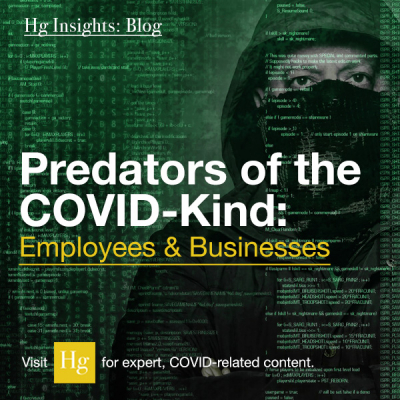By Jill Webster
We are entering year two of the pandemic, and the challenges the world workforce faced in 2020 continue in 2021. Many people continue to share workspaces with a spouse who is also working from home. There may also be children using the same space to complete their remote learning lessons. With the recent roll-out of the vaccine, adult children are assisting elderly parents register for the vaccine, while also taking care of their own needs under stressful and uncertain times. Most employees do not have their complete work computer set-up at home. Many are working from laptops or some modified, remote desktop set-up.
Due to all these factors—distractions, stress, and modified workstations—workers are more likely to become victims of fraud and cyber vulnerabilities. Predators are taking advantage of this scenario and using a variety of schemes to profit from this crisis. In this blog series, we provide tips to keep your working-from-home life safe and business protection tips to prevent fraud.
More Predators of the COVID-Kind in 2021
The latest scam of 2021 involves fraudsters seeking to gain access to your personally identifiable information. According to the FTC, the send phishing emails pretending to represent the federal Small Business Administration Office of Disaster Assistance offering up to $250,000 in small business loans. The email is signed by a supposed “loan specialist” at the SBA. Red flags should be flying! This is a scam!! The FTC also reported hearing “from companies that have applied for loans through websites that falsely claimed an SBA affiliation. That tactic has already resulted in an FTC law enforcement action and multiple FTC-SBA warning letters.”
To protect your small business from this latest string of scams, the FTC recommends:
- Checking your credit report regularly.
- Seek reliable sources of information.
- Check out lenders before sharing personally identifiable information.
To read the FTC’s full blog post, “Business owners: Latest COVID scam is directed at you,” click here.
Tips to Keep Employees Working-from-Home Safe During the Pandemic
- Abide by your employer’s security guidelines.
- Shred sensitive data.
- Make sure security software is current. Ensure passwords are strong and long, using a combination of capital and lowercase letters, numbers, and symbols at least 12 characters long.
- Keep sensitive files locked securely.
- If a laptop is being used, ensure that it has a password. Do not ever leave it out of your sight.
- Be sure your home network is secure. Turn on encryption (WPA2 or WPA3) on your router.
Online Extortion Scams Increasing During the COVID-19 Crisis
The FBI is warning about a scheme where predators are sending extortion emails threatening to share sexually explicit images or compromising videos of the recipient to the victim’s contacts. The scheme can vary, but there are some key common elements. Fraudsters are constantly changing their tactics to keep up with current topics in order to seem legitimate. Be aware of these key suspicious elements:
- The extortion email is sent from someone that the recipient does not know and often has grammatical errors.
- The email contains personal information of the recipient, such as a password, to scare them.
- The email states the scammer has images or videos of the recipient either cheating on a spouse or visiting adult websites.
- The email states, “I had a serious spyware and adware infect your computer,” or “I have a recorded video of you” to explain how the explicit material was obtained.
- The email warns that the explicit material will be sent to the recipient’s contact list if a bribe is not paid.
- The email gives a small time frame to pay, usually 48 hours.
- The recipient is informed to pay the ransom in Bitcoin, which makes transactions difficult to trace.
Tips
- Do not open emails, attachments or click on links within emails from unknown senders.
- Review your bank activity frequently and your credit report at least annually to detect any unauthorized charges.
- Do not respond to any emails from senders you do not know.
- Do not save any compromising material on your phone or online.
- Regularly review privacy settings for social media accounts and confirm they are providing the maximum security available.
- Make passwords strong, long and do not use the same password for all websites.
- Do not ever share personal information through email. Even if it looks like a legitimate source or it is someone you know, do not send via email.
- Type addresses for websites manually instead of clicking links in an email or through an advertisement. It may look like a legitimate source and have a very similar web address, type it yourself to ensure it is correct.
The FBI does not approve of paying any extortion requests made online. This will allow these crimes to continue and potentially contribute to organized crime and violent crimes. If you have been the victim of this type of scheme, file a complaint at your local FBI office here.
Seven Coronavirus Scams Targeting Your Business
Scammers are targeting businesses that are taking advantage of concerns of COVID-19. This is a list of some of the scams that the Federal Trade Commission has been watching.
- Business email scams: Fraudulent emails that appear to come from a boss asking to transfer funds.
- Essential product scams: Scammers are imitating sites of products that are in high-demand. They take your order and your credit card information and never deliver. Type in URLs you know are reliable or verify with someone in your industry you trust.
- Money from government agency scams: If anyone calls offering money from the government for an upfront payment or personal information, it is a fraud.
- Public health scams: Messages claiming to be from the CDC or WHO. They ask for personal information, such as tax IDs or Social Security numbers. Do not respond, click on any links, or download anything. These are phishing or malware scams.
- IT scams: An email that appears to come from your technology department asking you to download something or requesting a password. Be alert for this type of fraud and have someone staff can go to for reliable information.
- Virus-related scams: Scammers are targeting employees working from home with virus-related products. Others are warning about Google not properly displaying business listing. Google is not calling. The best response is to hang up.
Want more information? Download Hg’s Predators of the COVID-Kind FactSheet for free!

Jill Webster first joined Hetherington Group in 2009, then returned in 2018. She has a keen eye for detail, inherent curiosity, and natural persistence that are beneficial when conducting investigations and researching for writing. She works on special projects and is responsible for in-house proofreading of client reports. She creates content for Hg’s blog regarding predators taking advantage of the most vulnerable populations during the COVID-19 pandemic. Ms. Webster develops material and creates webinars for online safety for children.




